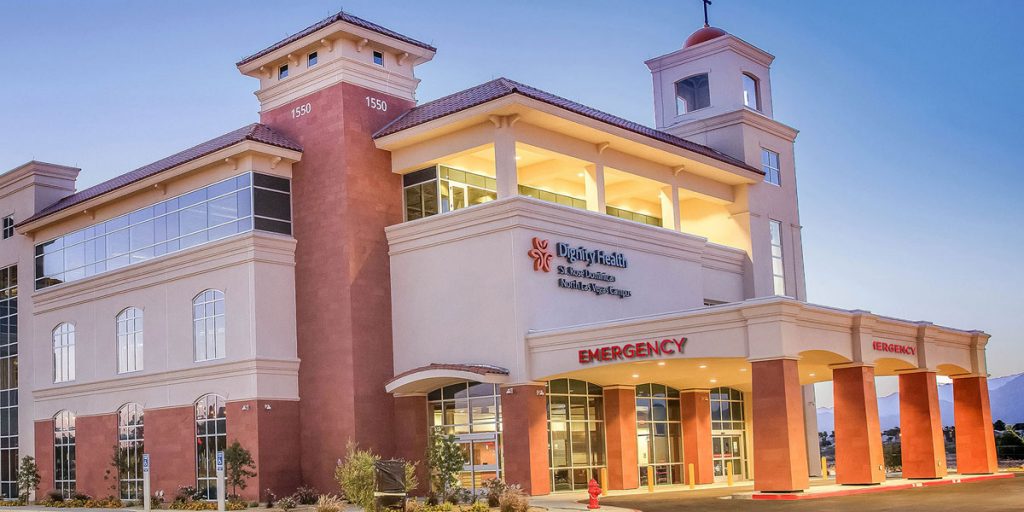Article originally available on CNBC.
The future of health care looks small and digital.
Micro hospitals are emerging in some suburban and urban markets as a backup to community facilities — or in regions where there is not enough demand for full-sized hospitals. The facilities range from 15,000 to 60,000 square feet, substantially smaller than community hospitals, and offer as few as eight beds.
Dignity Health St. Rose Dominican neighborhood hospital in Las Vegas.
Source: Emerus
Dignity Health St. Rose Dominican neighborhood hospital in Las Vegas.
The future of health care looks small and digital.
Micro hospitals are emerging in some suburban and urban markets as a backup to community facilities — or in regions where there is not enough demand for full-sized hospitals. The facilities range from 15,000 to 60,000 square feet, substantially smaller than community hospitals, and offer as few as eight beds.
“We still have to be fully prepared to see and treat any patient that walks through our doors,” Laura Hennum, a regional CEO of the Dignity Health St. Rose-Dominican Neighborhood Hospitals, told CNBC. She’s responsible for four micro facilities in the greater Las Vegas area.
These smaller facilities can provide lower-cost care for patients compared with traditional community hospitals, Dr. Richard Zane, chair of the Department of Emergency Medicine at the University of Colorado, told CNBC.
Mega hospitals, which can offer as many as 1,000-plus beds, “have evolved into large, profitable, expensive, technology-laden institutions,” Zane said.
By contrast, micro hospitals can perform many of the same services as larger ones, and through the advent of technology and shorter hospital stays, can lower patient costs, Zane said.
“Micro hospitals are the decentralization of health care,” he said. “You can match the cost of care to the perfect environment.” Zane, who has experience with implementing systems of emergency care and access, added patients typically follow up with their care providers virtually, thus lowering costs even more.
Micro hospitals appear to be one of many possible solutions to lower health costs for some communities as health spending rises in the U.S. and corporations begin to take the cost of care for employees into their own hands.
Berkshire Hathaway‘s Warren Buffett told CNBC on Monday that health-care spending is a “tapeworm on the economic system.” His venture with Amazon‘s Jeff Bezos and J.P. Morgan‘s Jamie Dimon, announced in late January, is designed to cut health costs and improve services for the three companies’ U.S. employees.
Additionally, CNBC has learned U.S. tech giant Apple is launching a group of health clinics called AC Wellness for its employees and their families this spring. The primary care group will initially only serve Apple’s employees in Santa Clara County, California, where its headquarters are located.
Micro hospitals can provide more personalized care
Micro hospitals, also called neighborhood hospitals, have cropped up in states such as Nevada, Arizona, Colorado and Texas. Saint Luke’s Health System in Leawood, Kansas, recently opened its own 17,000-square-foot micro hospital, no bigger than an average CVS Health store.
Hennum at Dignity Health St. Rose-Dominican told CNBC these facilities are not meant to replace larger hospitals or emergency rooms but can provide a kinder, more personalized level of care.
Hennum said the micro facilities can treat things like gunshot wounds and high-risk pregnancies, adding patients usually wait no longer than 11 minutes, on average, from entering the door to seeing a doctor.
“We only transfer 5 percent, or sometimes in other locations, 4 percent of our patients,” Hennum told CNBC. “We treat or discharge the vast majority of patients we see. … And we brought additional jobs to our community. I’ve interviewed more than 250 people.”
Larger hospitals still have their place, however. Mega hospitals have the resources to perform intensive and complex procedures whereas micro hospitals tend to be less surgical, Zane told CNBC.
For example, a person experiencing a stroke or in need of certain cancer therapies will be treated by larger facilities or specialized centers, Zane said. Micro facilities can do routine surgical care like a knee replacement that would only require a doctor and an assistant, but nothing like a liver transplant, Zane explained.
Hennum said Dignity Health St. Rose-Dominican’s emergency rooms are prepared to address any patient issues that come through its doors. Typical patients they transfer include those who have had a stroke or are suffering from a STEMI, a very serious type of heart attack where one of the heart’s arteries is blocked.
Dignity Health St. Rose-Dominican, which owns and operates 39 hospitals in California, Arizona and Nevada, is in a partnership with Emerus for the neighborhood hospitals in Las Vegas.
Emerus, a developer of micro hospitals, has more than 28 facilities nationwide and more than 20 under development. Hennum said the company is focused on innovation and consistently acquires the expertise of experienced health-care professionals.

